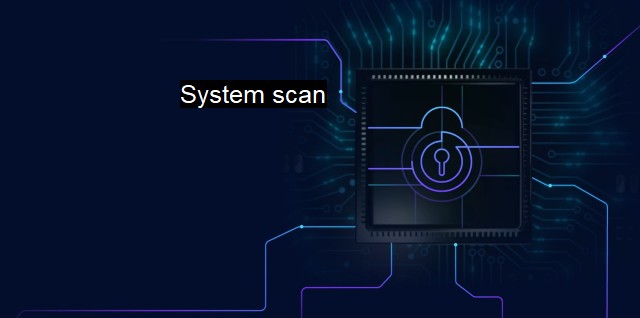What is System scan?
Securing your Computer: The Importance of System Scans in Cybersecurity
In cybersecurity and antivirus terminologies, a 'system scan’ represents a diagnostic process, discerning the health and security facets of a computer system, network or web application. The very principle of a system scan resembles a physical examination conducted by a doctor to ensure the comprehensive health of a patient. Dissecting this concept, a system scan entails performing an exhaustive sweep of computer systems to establish their security status. This is explicitly crucial in the aggressive cyber landscape of the present era marked by a rising diffusion of hackers and cybercriminals.A comprehensive system scan breaks down into two significant dimensions: software scan and hardware scan. In a software scan, the scan assesses each installed application and operating system files for any irregular anomalies. It seeks out any malicious code like viruses, worms, spyware, Trojans, Bots, and other forms of malware entrenched in the system files. Similarly, the hardware scan meticulously goes over all connected physical devices, checking for any noticeable discrepancies from the threshold health and performance values.
Particularly, system scans play an integral role in running antivirus software programs. With the framework of antivirus software to scan computers and networks, it becomes achievable to notice any pernicious elements infecting system integrity and safety. Antivirus systems scans reveal hidden malware, quarantine them, and, most importantly, exterminate them, effectively reducing any threats to system utilities and users' data. Regular antiviruses emphasize real-time detections, still, undetected threats slip in between the cracks, posing significant damage potential.
System scans are canopies housing fragile subtypes beneath: quick scan, full system scan, custom scan, and boot-time scan. Quick scan, adhering to its literal meaning, scans through the commonly attacking malware hiding spots, furnishing scan reports in a snap. Full system scan, on the contrary, tends to be relatively slow and thoroughly inspects the entire computer, including all files, applications, and directories.
Meanwhile, a custom scan is user-configurable and lets users decide the folders, files, and drives to engage in scans. Boot-time scan is a unique system scan modularized to examine and cleanse malware during system startup, much before the operating system loads fully, thwarting sophisticated malware’s stubborn persistence.
Prioritizing continuous system scans contribute to several benefits. It enhances system performance, prevents data theft, detects security stress points, and enables timely identification and rectification of vulnerabilities, thereby improving the security posture of a computer system. Yet, system scans, while critical, aren’t the solely saving armor from the ominous brooding cyber threats. But coupling these scans with firewall, secure network connections, updated software, password hygiene, and intelligent online behavior amplifies system security multifold.
Another critical facet related to system scans is automating them. Seldom do end-users run manual system scans frequently due to viewer fatigue or non-technical background. This is why setting automatic system scans becomes a cybersecurity necessity. Automating scans assures regular system monitoring, detecting fresh threats upon their emergence, decreasing the room for damage infliction, and preserving system resources and extracted data. Antivirus software facilitates such automation, upholding daily, bi-weekly, or weekly scans, depending on the program's configurability and the system's requirements.
Understanding 'system scan' is to comprehend the essence of well-rounded cybersecurity strategies. With abounding threats around the digital corner, placing trust in a system scan's potential to augur unethical infiltrations rightly is enduring. Hence, diligent and regular system scans is indispensable, ensuring the foundational step in erecting a resilient fort around sensitive data and system files against trending cyber-attacks.

System scan FAQs
What is a system scan?
A system scan is a process done by antivirus software to check a computer or device for any viruses, malware, or other security threats. The scan looks for any suspicious files or behavior that could indicate an infection.How often should I perform a system scan?
It's recommended to perform a system scan at least once a week, to ensure that your computer or device is free from any viruses. However, if you suspect that your computer may be infected, you should run a system scan immediately.How long does a system scan take?
The length of time a system scan takes depends on the size of your computer's hard drive and the amount of data stored on it. A scan of a smaller hard drive with less data may only take a few minutes. A larger hard drive with more data may take several hours to complete.Can a system scan remove viruses from my computer?
Yes, a system scan can remove viruses and other types of malware from your computer. Once the scan has detected and identified the virus, the antivirus software will attempt to remove it from your system. In some cases, you may need to manually delete the infected files, or the antivirus software may prompt you to take additional actions to remove the threat.| | A | | | B | | | C | | | D | | | E | | | F | | | G | | | H | | | I | | | J | | | K | | | L | | | M | |
| | N | | | O | | | P | | | Q | | | R | | | S | | | T | | | U | | | V | | | W | | | X | | | Y | | | Z | |
| | 1 | | | 2 | | | 3 | | | 4 | | | 7 | | | 8 | | |||||||